RIP our TBR stacks.
The Job of the Wasp by Colin Winette (January 9)
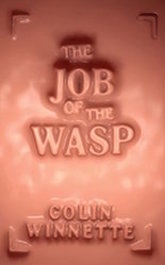
A plucky wasp heads to the big city to start on a career in advertising! No, no I’m kidding—this is actually a fantastic-looking Gothic novel. I love haunted house novels, and I love boarding house stories. So imagine my delight when I found out about The Job of the Wasp! The young narrator ends up at a school for orphans that features both uncaring classmates and a Dickensianly brutal headmaster—but soon bodies start turning up, and the book takes an even more sinister turn that seems to be more than a bit supernatural. —Leah Schnelbach
The Unmapped Country by Ann Quin (January 16)
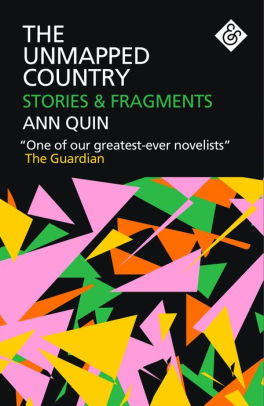
To call Ann Quin’s fiction “disconcerting” is to engage in understatement of the highest order. Like that of Kathy Acker, her work from decades ago still reads as tremendously ahead of its time. And in novels like Berg and Tripticks, Quin conveyed alienation on a level that turns the narrative surreal. The Unmapped Country collects a host of previously uncollected stories and unfinished work, and is a potential treasure trove for those who seek unexpected ways of viewing the greater world. —Tobias Carroll
Red Clocksby Leni Zumas (January 16)
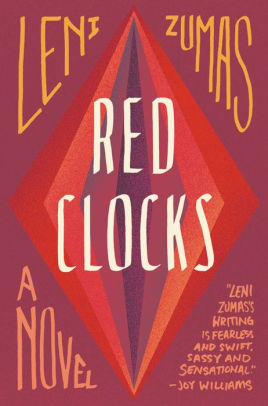
I’m so frickin’ excited to see Zumas (The Listeners) writing a speculative novel—and sort of terrified, because Red Clocks sounds like an even more plausibly frightening sibling to The Handmaid’s Tale. In this future, abortion is banned in the US, and unmarried people cannot adopt children. Zumas’s five central characters have to make their very different ways in this world, and in a small Oregon town, no less. (I’m from a small town in Oregon; this is not a setting I often see on the page.) Red Clocks already has blurbs from the likes of Kelly Link and Maggie Nelson; it’s on the absolute top of my Cannot Wait to Read list. —Molly Templeton
The Sky Is Yours by Chandler Klang Smith (January 23)
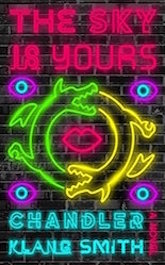
Crumbling metropolis? Spoiled rich kids thrown out of their privilege and forced to rely on their wits? Real, literal dragons circling overhead, threatening fiery destruction at every moment? Is it my birthday already? The Sky Is Yours sounds like it will have everything you could possibly want in a novel. This is Chandler Klang Smith’s second novel, after the genre-defying Goldenland Past Dark (which can maybe be summed up as a picaresque/horror/circus story?) and I can’t wait to see how her inventive ideas play out on the pages of her new novel. —Leah Schnelbach
Frankenstein in Baghdad by Ahmed Saadawi (January 23)
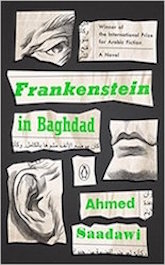
This book seems to do what it says on the tin: the “Creature” is stitched together from the corpses of people who died in bombings in Baghdad, and he stalks the streets seeking vengeance. I’m in. Ahmed Saadawi’s book was released in 2014, and won the 2014 International Prize for Arabic Fiction, and the translation by Jonathan Wright finally hits the U.S. in January.
I love it when authors update classic horror stories to mirror our current culture, and the idea of an Iraqi writer interpreting a British Romantic SF/horror story and using it to comment on war and American Imperialism just has me (in the words of another riff on Dr. Frankenstein) quivering with antici….pation. —Leah Schnelbach
In Frankenstein in Baghdad, Saadawi takes the violent consequences of America’s invasion of Iraq and teases out the idea of someone gathering up the body-parts from car bombs to form a new body, one that can be buried with dignity. But when a wandering soul finds its way into this patchwork corpse, the results are chilling. An intoxicating blend of magical realism and gritty noir, Saadawi’s story offers us a new and important perspective on this damaging war. —Rachel S. Cordasco
The Hazel Wood by Melissa Albert (January 30)
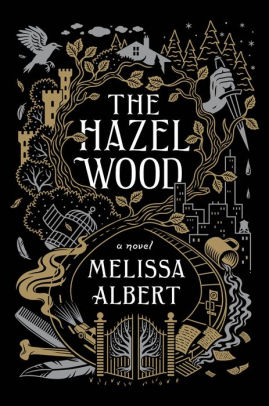
This debut has a special place in my heart because I got to know about its existence long before anyone else: I’m friends with Melissa, and had the honor of beta-reading one of the final drafts of her manuscript before she got an agent and a book deal, in a head-whirlingly short amount of time. Not that I’m surprised: It’s the kind of portal fantasy that illustrates the magic and menace of both worlds, as 17-year-old Alice ventures into the supernatural Hinterland, the inspiration for her grandmother’s famous dark fairy tales, in order to rescue her kidnapped mother.
And here’s the kicker—I don’t know how it ends! My feedback mostly teased apart plot threads in the last third of the novel, long before revisions. So I can’t wait to grasp that gorgeous metallic cover and find out just how Alice battles the powers of storytelling and rewrites her own ending. —Natalie Zutter
Tempests and Slaughter by Tamora Pierce (February 6)
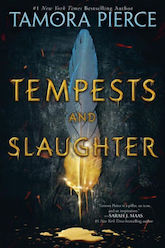
The Numair Chronicles, a.k.a. Numair: The Early Years, has been in the works since at least 2005. I remember being active in the Tortall fandom, eagerly awaiting the backstory that would finally explain how crazy-talented but headstrong student Arram Draper becomes famed sorcerer Numair Salmalín, and all the bridges burned between those two identities. And now it’s finally (almost) here.
The thing is, Numair wasn’t even one of my top characters, though I found his magic teacher/student romance with Daine appropriately scandalous as a teenager. If you had asked me which Tortallans I’d like to see more backstory for, he’s not at the top of the list. However! There’s something to the fact that we get to know Numair as someone else. Plus, ever since the last Harry Potter book, I’ve never quite jibed with any of the “magic school” successors, yet I’m ready to enroll in the Imperial University with Arram as he wrestles with his powerful Gift and the even greater challenges of forging meaningful relationships with love interest Varice and future frenemy Ozorne. —Natalie Zutter
The World Only Spins Forward: The Ascent of Angels in America by Isaac Butler and Dan Kois (February 13)
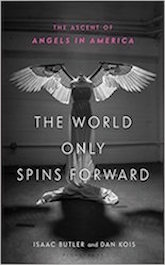
I try not to say the “such and such saved my life” because I always feel like that’s too melodramatic, and kind of reductive in my case—there were many factors, artistic and personal, that helped me decide to get out of bed every morning during middle and high school. I will say though, with no hyperbole, that Tony Kushner’s Angels in America made me what I am now, for better and for worse. It influenced my understanding of America’s socio-political history, it rewarded my baby socialism with gorgeous monologues and shaped my interest in the study of America’s religious history. It gave me my language. I am so, so excited that such a giant, cacophonous work of theater has gotten an oral history. —Leah Schnelbach
Children of Blood and Bone by Tomi Adeyemi (March 16)
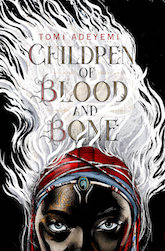
A rogue princess and a rebellious magician take on an oppressive monarchy set in a West African-esque culture isn’t exactly something you see every day, so this sounds super exciting. A bit of magic, a bit of violence, a bit of blossoming romance, and a whole lot of rebellion. —Alex Brown
Stone Mad by Elizabeth Bear (March 20)
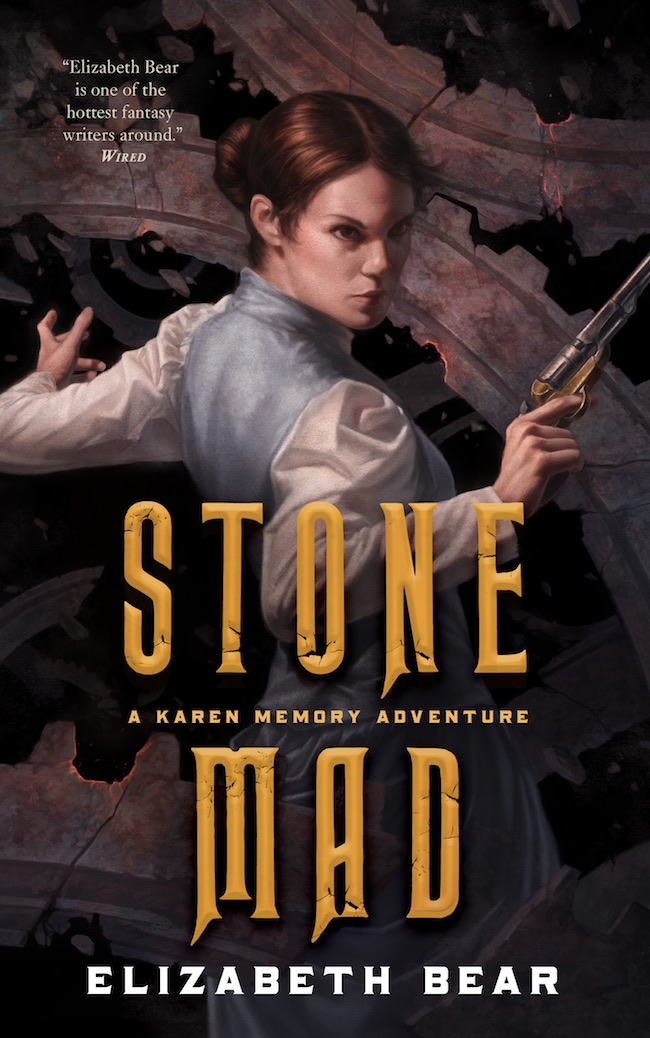
I loved Karen Memory, and I’m really looking forward to reading more adventures involving Karen and Priya in their steampunk city on the Pacific coast of the American continent. I had an opportunity to read an early draft of this novella, and it deals beautifully with Karen and Priya working out the boundaries and parameters of their relationship—their insecurities and jealousies—while also figuring out what’s going on with a pair of stage mediums, a hotel that’s collapsing around them, and an uninvited guest. —Liz Bourke
Space Opera by Catherynne M. Valente (April 3)
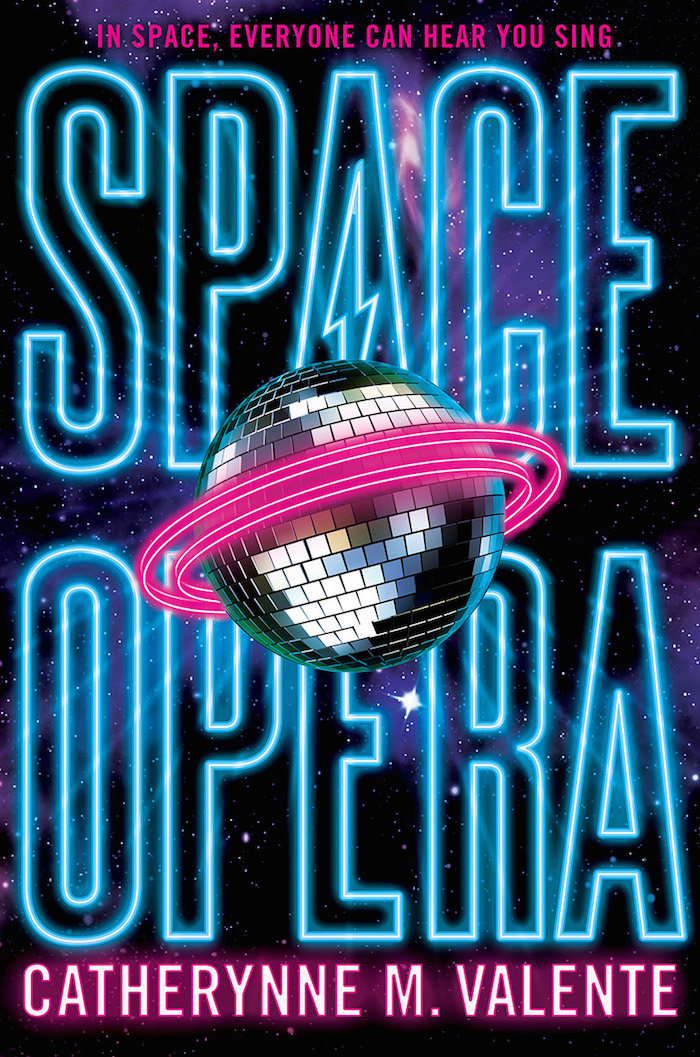
Eurovision is one of those annual cultural events I always mean to watch, then never get my act together in terms of putting in the time, deciding which teams to back, following the breathless live-tweeting, etc. But that doesn’t mean that I doubt for a second that Eurovision would be the perfect venue in which to decide whether humanity gets to join an intergalactic federation or be wiped out faster than those The Voice judges can flip around their chairs.
Despite not watching an entire Eurovision run, Moldova’s “Run Away” is nonetheless one of my go-to work songs (Epic Sax Guy FTW!), as it provides the right kind of epic score to a tale of a “glam-punk one-hit-wonder ex-band called Decibel Jones and the Absolute Zeroes” going note to note against the greatest musicians in the Metagalactic Grand Prix.
https://www.youtube.com/watch?v=gy1B3agGNxw
It’s one of those gleeful premises that just promises to deliver. And after devouring Valente’s steampunky noirish alt-history space opera Radiance and her riffs on comic-book injustices in The Refrigerator Monologues, I am all ready for more Valente in 2018. —Natalie Zutter
I just want to say that I’m with Natalie 100% on this, and want to know when I can enter this competition myself. —Emmet Asher-Perrin
Dread Nation by Justina Ireland (April 3)
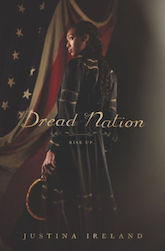
Alternate history! Bad-ass Black girl main character! Zombies! Zombie hunters! Using discussions of race and racism to decolonize SFF! —Alex Brown
Star Wars Lightsabers: A Guide to Weapons of the Force by Pablo Hidalgo (April 10)
This is actually an update to an old book that desperately needs updating. And I’m a nerd for reference books. And lightsabers. You’re talking to a person who had nearly all the Star Wars Essential Guides as a kid, and stared at Incredible Cross-Sections for hours on end. And I’ve had a lot of question about lightsabers construction lately, so I am personally owed some answers. No, sorry, I just really want a pretty book full of lightsabers. (Okay, the other Star Wars book I’m making grabby hands for is an upcoming one about Padmé and her handmaidens, but there’s no release date on that as of yet.) —Emmet Asher-Perrin
Circe by Madeline Miller (April 10)
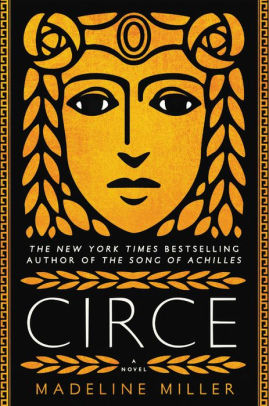
I’m a fool who still hasn’t read Miller’s The Song of Achilles—but that’s going to have to wait, because Circe‘s description sounds like the coming-of-Titan’s-age mythology tale I had never thought to dream of. Circe’s story concerns witchcraft, rebellion, choosing your place in the world, and all the mythological characters I fell in love with as a small bookish child. I’m going to have to set aside a weekend for this one when it comes out. —Molly Templeton
The Changelingby Joy Williams (April 10)
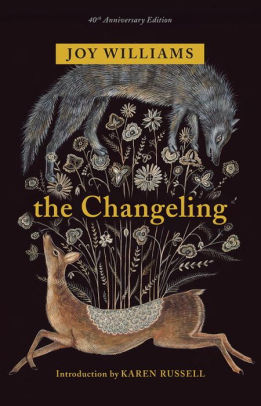
Many of Joy Williams’s books have blended the hauntingly realistic with the jarringly surreal–for instance, her stunning The Quick and the Dead. The Changeling (due to be reissued next year) is a lot of things: an exploration of the aftermath of trauma, a psychological study, and a survey of a damaged family dynamic. But there are also, as its title suggests, mythical and folkloric undercurrents that run throughout it, giving it a shifting scope and a cumulative power. —Tobias Carroll
Head On by John Scalzi (April 17)
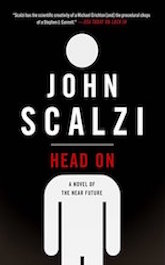
John Scalzi’s Lock In was a thoughtful exploration of how societies shape themselves around their people, how technology changes its users, and how cyberspace evolves to augment physical life—all wrapped up inside a fascinating murder mystery. In the future of Lock In, a pandemic called Haden’s syndrome resulted in millions of people being “locked in”—conscious, but trapped in their minds and unable to move. In response to the condition, people have developed threeps, which are essentially android bodies that Haden’s sufferers can control in order to interact with people and lead “normal” lives, while they’ve also built a cyberspace called The Agora, where they can communicate with each other more directly, without the bother of bodies. I’m excited to see where Scalzi takes the sequel, especially since he’s building in a fictional threep-based sport, played only by people with Haden’s, that’s equal parts American football and gladiatorial combat. —Leah Schnelbach
All Rivers Run Free by Natasha Carthew (April 19, UK)
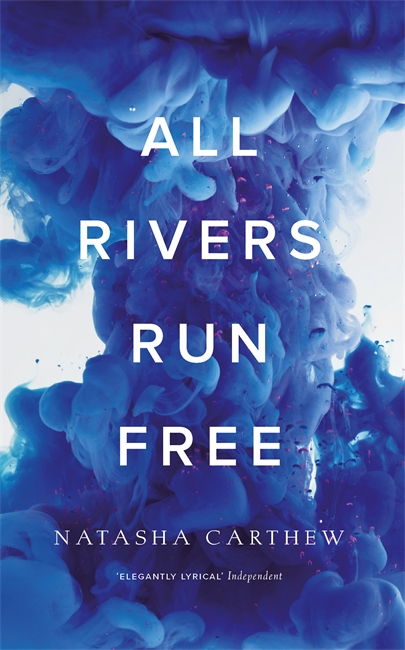
Winter Damage was a wonder. “A stone-cold stunner with an uncommonly humble heart” that I urged you, in my review, to take into yours, too. Fully five years since Ennor Carne went into the wilderness in search of her mother, her Carnegie Award nominated creator Natasha Carthew is back, at last, with All Rivers Run Free, a dark and dystopian narrative set in a collapsed Cornwall in which a woman on the edge of the sea saves a girl on the edge of life who’s sure to save her in turn. Its premise is affecting and its central characters sound tremendously tragic, but the reason I’ll be reading All Rivers Run Free is because of Carthew’s impossibly pretty prose. She’s a poet, you know—and oh, it shows! —Niall Alexander
The Poppy War by R.F. Kuang (May 1)
“Epic historical military fantasy” sounds like a whole lot of book—in a good way. When Rin tests into the most elite military school in her country, it’s good and bad: her classmates are horrible, but she discovers an unexpected power. Though it’s not a YA book, The Poppy War‘s cover copy reminds me of both Eon and An Ember in the Ashes: magical powers, intense school, and harrowing conflict. Yes, please. —Molly Templeton
Ship It by Britta Lundin (May 1)
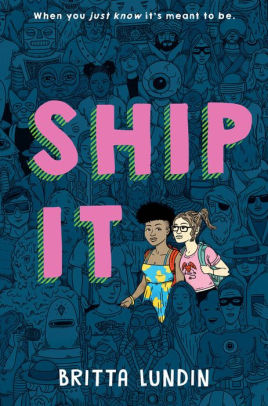
It still boggles my mind that YAs about fandom have become their own subgenre, but I’ve been reluctant to read too many of them. For every Fangirl, that encapsulates the odd dichotomy of being famous online but floundering IRL, there are others that seem as shallow as an offhand retweet, trying to bank on cosplay or fandom or whatever hot hashtag of the moment. But I knew that I was in good hands when I saw the title of Lundin’s debut: Ship It, about a fangirl who is so convinced that the actor playing one half of her OTP (One True Pairing) is gay that she causes a viral incident when he is forced to burst her bubble.
Fans are not perfect, and creators are not perfect, and the interactions between the two can often devolve into thorny misunderstandings. I have hope that Lundin, a writer on Riverdale who actively engages with the show’s fans on social media, will handle this with the respect it deserves. —Natalie Zutter
The Mere Wife by Maria Dahvana Headley (May 22)
This is a retelling of Beowulf, from Grendel’s mom’s perspective, set in a modern gated community. It’s by Maria Dahvana Headley, who not only wrote the spectacular Magonia but also “Astronaut,” my very favorite of Tor.com’s “Nevertheless, She Persisted” series of short stories. And from every description I’ve read, this is a book about weirdness breaking through the shell of suburbia that 15-year-old Leah needed like she needed oxygen. I’m pretty sure current Leah will still need it, and she can’t wait to read it. —Leah Schnelbach
The Bottom of the Sky by Rodrigo Fresan, translated by Will Vanderhyden (May 29)
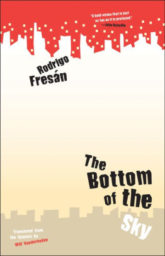
The Bottom of the Sky deals with the trauma of violence and brutality, but this time the central event is 9/11. At its heart, this novel is about a trio of kids who find meaning and purpose in science fiction, but on a higher level, it’s about how humans process war and violence- how we distance ourselves from certain realities in order to build other, less traumatic ones in order to keep on living. Fresan plays with and sculpts language like no other, and this is just his latest work of brilliance translated into English by Will Vanderhyden, for which we should be extremely grateful. —Rachel S. Cordasco
Bruja Born by Zoraida Córdova (June 5)
The sequel to the awesome Labyrinth Lost expands the Brooklyn Brujas world with bruja Lula and her undead boyfriend Maks. Lula learns the hard way that bringing someone back from the dead has deadly consequences. *shivers with anticipation*
Trail of Lightning by Rebecca Roanhorse (June 26)
This book just popped up on my radar, and I know very little about it—but it involves post-climate-apocalypse monster-hunting with a heroine who’s from the former Navajo reservation (now a place called Dinetah). Gods and tricksters and legends are real, but so are monsters, and technology is falling apart. Can this be a movie? I want to read it and watch it. —Molly Templeton
The Cabin at the End of the World by Paul Tremblay (June 26)
What I’m most looking forward to in 2018 is Paul Tremblay’s forthcoming novel, The Cabin at the End of the World. The author of the award-winning A Head Full of Ghosts has a real knack for families in distress and this tale of a home invasion is already giving me the creeps, just from the scant preview I heard Tremblay read at this summer’s NecronomiCon. —Theresa DeLucci
Bloody Roseby Nicholas Eames (July 10)
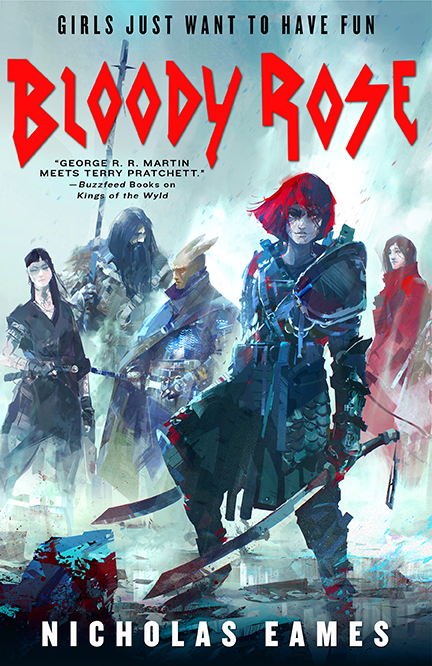
Looking back at the books I’ve read in recent years, there’s no one that was more fun with than Kings of the Wyld by Nicholas Eames. A perfectly pitched paean that traded the fellowships of standard fantasy for rock and roll bands full of brutes with lutes, Eames’ awesome first novel was, in its surprisingly sensitive examination of age and fame and family, so much more than a metaphor, cleverly extended. But it was also about blokes, mostly. Book two of The Band, Bloody Rose, looks likely to right that wrong, and I for one can’t wait to walk on the wyld side with the women of Grandual’s greatest group when they tour in 2018. —Niall Alexander
The Seasby Samantha Hunt (July 10)
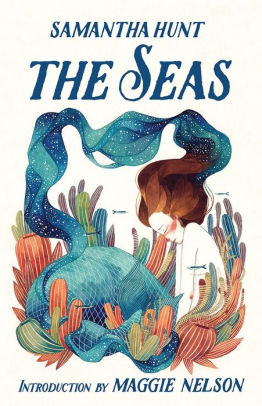
Like nearly everything Samantha Hunt has written, her novel The Seas—due to be reissued by Tin House in 2018—brings together a moving story of isolation with a foray into the weird or fantastical. This novel takes as its subject a young woman living in a small town and grappling with abandonment; also, she might be a mermaid. It’s a haunting book that’s stuck with me ever since I first read it, and I’m glad to see a new edition of it entering the world. —Tobias Carroll
Record of a Spaceborn Fewby Becky Chambers (July 24)
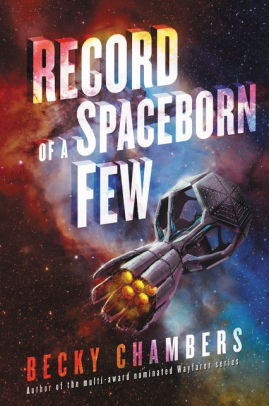
Becky Chambers’ books are thoughtful, intelligent, and character-driven. The underpinning—space is for everyone—is a (surprisingly) revolutionary take on a classic genre; telling stories of an joyful, inclusive and utterly human future. From the extracts already released, Record of a Spaceborn Few looks like another stunner. I can’t wait. —Jared Shurin
The Monster Baru Cormorant by Seth Dickinson (Fall 2018)
Me with this book is basically the Meryl Streep GIF shouting BARUUUUU!

The Traitor Baru Cormorant began with a promise: This is the truth. You will know because it hurts. Two years later, the sequel opens with a question: If something hurts, does that make it true? Our dear, awful, conniving, brilliant Baru has been elevated in Falcresti society by doing exactly what her lifelong revenge plot dictates, but who wants to bet that her arrogance and penchant for collateral damage are going to bite her in the ass? While I had trouble following all of the financial machinations in the first novel, Baru’s white-hot hatred of the empire that eclipsed her home shone right through—and that’s what makes her more than just a traitor, more than a monster. —Natalie Zutter
The Lady’s Guide to Petticoats and Piracy by Mackenzi Lee (Fall 2018)
This sequel to The Gentleman’s Guide to Vice and Virtue isn’t set to be released until October. Not much is known about it except that it centers of (a possibly ace/aro) Felicity and will be full of feminism and 18th century pirate ships. Count me in! –Alex Brown
Early Riser by Jasper Fforde (2018)
The release of Early Riser has been put off so often that I’ll only believe it’s coming out in 2018 when I can hold it in my damned hands, but if it is—and oh, I hope it is—I’ll be one happy chappy. If any other author were to ask me to “imagine a world where all humans must hibernate through a brutally cold winter, their bodies dangerously close to death as they enter an ultra-low metabolic state of utterly dreamless sleep,” I might just politely decline—but it’s Jasper Fforde doing the asking, and he wrote Shades of Grey. I adored that book so dearly and so clearly that I forced it on almost everybody I knew, and I’m hoping to do the same with his new one too. —Niall Alexander
Riddance by Shelley Jackson (2018)
I don’t know a lot about this one, to be honest; all I can really go on is the announcement that 2018 would bring a new novel by Jackson. Apparently it’s about children learning to channel the dead, so that’s a plus. And Jackson’s previous books, the novel Half Life and the collection The Melancholy of Anatomy, were both tremendous works of the uncanny, so my hopes are high for this one. —Tobias Carroll
Do You Dream of Terra-Two by Temi Oh (2019)
Temi Oh’s Do You Dream of Terra-Two looks like it’ll tick all my boxes—thoughtful SF, crossed with a murder mystery and a hint of teen drama. The debut from this neuroscientist-turned-writer comes 2019, but never too early to hope. —Jared Shurin











The first of the year for me is likely to be Elysium Fire by Alastair Reynolds (released in January in the UK; I’m not sure of the US release date).
Looking forward to the new Scalzi, Alastair Reynolds, and Jo Walton( both her newest novel and her history of the Hugos).
For me, in addition to the Becky Chambers book listed in the article, I’ve got two on my radar, both tentatively scheduled for June of 2018:
Summerland, by Hannu Rajaniemi, an alternate history ‘ecto-punk’ novel in which spiritualist theories of the 18th/19th century were true, and Britain has already started colonizing the afterlife.
and
The Freeze-Frame Revolution by Peter Watts, a novella-length (or just barely novel length technically according to the author) story in the same universe as his Sunflowers short stories, The Island, Giants, and Hotshot.
For me, it’s Ruthanna Emrys’ Deep Roots.
The Iron Season, the sequel to The Golem and the Jinni, is the book I’m most eagerly awaiting.
I’m looking froward to Timothy Zahn‘s Thrawn: Alliances, the second of his Thrawn works to be set in the new continuity. I finally got around to reading Thrawn in the last few days and was pleasantly surprised. I’m looking forward to a sequel now.
The Cabin at the End of the World is stunning. It was an up until 3am wide-eyed, white-knuckled read for me. I can’t wait for it to come out properly so that I can talk to people about it.
Seanan McGuire’s Beneath the Sugar Sky, I can’t wait! If you haven’t read the first two I highly recommend them.
Same goes for Becky Chambers, her first two, A Long Way to a Small, Angry Planet and it’s sort-of-kind-of-a-sequel A Closed and Common Orbit were so good I can’t wait to see what she does with this one.
So many books…..
Seanan McGuire’s Beneath the Sugar Sky, I can’t wait! If you haven’t read the first two I highly recommend them.
Same goes for Becky Chambers, her first two, A Long Way to a Small, Angry Planet and it’s sort-of-kind-of-a-sequel A Closed and Common Orbit were so good I can’t wait to see what she does with this one.
So many books…..
The next October Daye, InCryptid, and Wayward Children books.
Thanks for letting me know about the Lightsabers book by Hidalgo. That should be a winner!
Personally, I’m just excited for whatever Brandon Sanderson releases this year. Skyward is all that I’m really aware of (maybe Legion, too?), but I’m still holding out hope for a Cosmere short to tide me over until The Lost Metal in 2019.
@14: Vol. 2 of White Sands, a Cosmere graphic novel, is apparently being released on 20 February.
As for eagerly expected releases, I’m surprised nobody has mentioned Scott Lynch’s Thorn of Emberlain. In an interview at Unreliable Narrators last month Lynch seemed to be certain that this one will come out next year…
Interestingly enough, the German translation is already listed with a release date in June which may be an indicator that the book is close to completion.
BARUUUUUUUUUUUUUUUUUUUUUUUUUUUUU!!!!!!!!!!!!!!!!!!!!!!!!!!!!!
I’m looking forward to Bryan Camp’s debut, The City of Lost Fortunes — Post-Katrina New Orleans urban fantasy with syncretic mythology!
TRAIL OF LIGHTNING is right at the top of my list. Everyone should follow Rebecca on Twitter. She’s amazing and is constantly insightful. I know her debut is just gonna smash all expectations.
THE POPPY WAR is on my list as well because it sounds like a unique backdrop for building a world behind. If I never see another medieval based fantasy it won’t be soon enough (though a damn stellar story will always draw my attention). Anyway, it looks great.
THE MONSTER BARU COMORANT is one I’m anxious for as well. Baru is my type of character because I find myself drawn to and revolted by her. She’s like Emily Thorne thrown into a fantasy world.
Where’s Port of Shadows?
I am also a Star Wars reference book nerd. I own almost all of them and I will also be buying
Star Wars Lightsabers: A Guide to Weapons of the Force
These books are always full of nerdy goodness.
They all sound interesting! And aside from Scalzi and Bear, by authors I don’t yet know. My TBR is already greater than 400 book high; how the heck can I add all these good things???!!!
After writing my previous comment I’d asked the German publisher regarding the translation of The Thorn of Emberlain that had been listed for June 2018.
I received a response the other day that, not surprisingly, they will have to push back this date as they haven’t yet received the manuscript for translation.
Yet, this doesn’t rule out a 2018 release of the original version and the way Lynch talked about that in the interview I’ve mentioned before lets me stay optimistic (for the moment).
Really looking forward to Smoke Eaters from Angry Robot. Firefighters versus dragons!
Bloody Rose, too.
One book which didn’t make the list was the latest Ciaphas Cain book, “Choose Your Enemies”, by Sandy Mitchell. His last sane man in the galaxy, Ciaphas Cain (HERO OF THE IMPERIUM!!!!), again tries to find an easy life behind the lines, but is inevitably back in the thick of the action. This time he has to decide which is the most dangerous, the evil forces of chaos, the cunning and cruel Eldar, or disappointing his girlfrien,d Amberley(who just happens to be an Imperial Inquisitor). Yes, this one is going to be tricky.
Just finished it, and it was awesome and people should check it out. The grimdarkness of the future has never been so much fun.